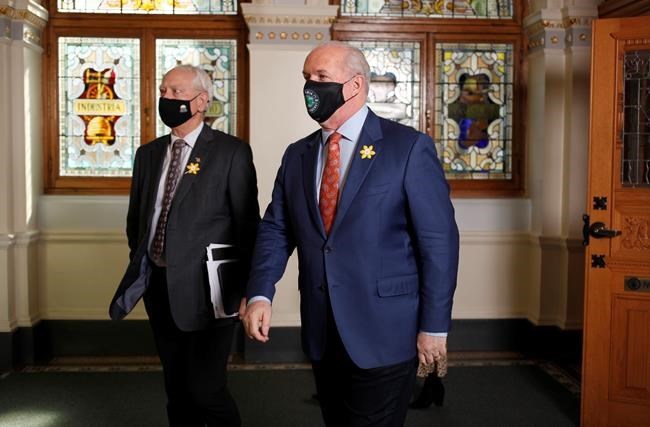
Minister of Indigenous Relations and Reconciliation Murray Rankin, left, and Premier John Horgan leave the chamber following the prorogation address ahead of a throne speech at the legislature in Victoria on Monday, April 12, 2021. THE CANADIAN PRESS/Chad Hipolito
October 07, 2021 - 3:50 PM
VANCOUVER - The B.C. government has signed an agreement with a First Nation to provide $65 million in funding to support land restoration and cultural programs, four months after a court ruled the province had breached the nation's rights.
Indigenous Relations Minister Murray Rankin said the initial agreement will provide $35 million for Blueberry River First Nations to undertake land restoration activities and create jobs for band members and business opportunities for companies operating in the region.
The other $30 million will go toward helping the First Nation protect its cultural way of life and to expand its land management resources, as well as restoring the health of wildlife through management programs.
"Our goal is to work quickly to get certainty on a path, both long-term and immediate, so everybody is made whole," Rankin told a news conference Thursday.
A B.C. Supreme Court judge ruled in June that the provincial government had breached the nation's rights under Treaty 8, signed more than 120 years ago, because it allowed development such as forestry and natural gas extraction without the nation's approval.
The agreement will also see the restart of 195 forestry and oil projects that had been placed on hold due to the court's ruling.
But 20 other projects, which had been approved, will not proceed without negotiation with the First Nation because they related to development in areas of cultural importance.
Rankin said the government wants a better relationship with Indigenous Peoples and agreements like the one signed with the Blueberry River First Nations will help achieve that goal.
"We take the judge's findings seriously, we want to work better, we want to have a better process that involves First Nations in a more meaningful way," he said. "We want to make sure (First Nations) know and have some involvement as they're entitled to."
Chief Marvin Yahey of Blueberry River First Nations said during the joint news conference that he's pleased the province took the court ruling seriously and has committed to working with the band.
He called the funding "a historic event" that would help his members while also supporting businesses in the region.
"It's a first step that will provide resources in areas where it was lacking," he said. "It's a huge step."
The court found the province failed its treaty promise to maintain the nation's rights to hunt, fish and trap without interference.
The ruling said that while not one single project had a devastating effect on the community, the cumulative impact of a series of projects limited the nation's ability to maintain its treaty rights.
Two hydroelectric dams operate in the nation's territory, and the controversial Site C dam project is under construction on the Peace River.
The trial heard that over 84 per cent of Blueberry River territory is within 500 metres of an industrial disturbance.
The ruling gave the province six months to work with the nation to improve land management and the permitting process to respect the nation's rights under the treaty.
A 2016 report published by the David Suzuki Foundation and Ecotrust Canada found that more than 110,000 linear kilometres of roads, pipelines and transmission and seismic lines had been cut across less than 40,000 square kilometres of Blueberry River territory.
This report by The Canadian Press was first published Oct. 7, 2021.
News from © The Canadian Press, 2021